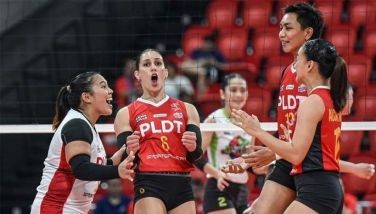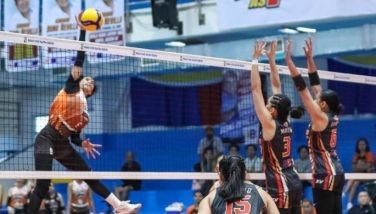Lessons from Seville

Gilas guard Jayson Castro used two words to describe the Philippine national team’s first foray at the FIBA World Cup in 36 years and first win in the global tournament in 40 years – “not bad.” The finish could’ve been better than 1-4 and sixth place in Group B. With a little more experience, the Philippines would’ve advanced to the knockout Round-of-16 in Madrid.
Gilas has absolutely nothing to be ashamed of. Sure, the Philippines was one of eight countries that were struck out early. But you’ve got to give credit to Gilas for fighting until the end, never surrendering and gaining the admiration of fans from all over the world for an inspiring portrayal of David in nearly bringing down three Goliaths – Argentina, Croatia and Puerto Rico. Bashers who like to chastise for the sake of chastising should be vilified. Those who think that the Philippines is wasting its time and resources trying to conquer the Land of the Giants are heartless, insensitive and unpatriotic.
There are 10 lessons that Gilas can learn from its Seville journey.
• Expand the selection pool. Now that Gilas has proved its mettle in world-class competition, coach Chot Reyes should be given a free hand in choosing whomever he thinks will fit into his system. Since the PBA has expressed full support for the Gilas program, then the pro league must make available all its players to the national pool. Reyes can’t be restricted in picking only one or two from this or that franchise. The freedom must be absolute as love of country is absolute. If the PBA is willing to sacrifice for the national interest, then that should translate into unrestricted drafting to build the best possible team to represent the country in FIBA tournaments.
• Blatche must adjust. No doubt, Andray Blatche played a key role in making Gilas competitive in Seville. But it must be pointed out that he could’ve done even better with more practice time with his teammates. Adjustments can’t be one-way. Blatche must learn how to adjust to teammates as his teammates must learn how to adjust to him. In Seville, Blatche played more like a small forward than a power forward or center. He’s not as comfortable playing back to the basket as facing it. Blatche likes to attack from the outside, using his agility and ability to put the ball on the floor to break down the defense. To make Blatche even more dangerous, he has to develop a post-up game so he invites the double and creates opportunities to kick out to shooters. Blatche can do so much more for Gilas.
* * * *
• Can’t stand around. When Blatche goes one-on-one, the tendency is his teammates just watch like spectators in the stands. The key is movement. If Blatche is bottled up, he’s got to know whom to pass to and his teammates must make themselves available to receive. If Blatche’s teammates are stagnant when he makes his move, the defense will collapse and force either a poor shot or a bad pass. Blatche is an outstanding player but he’ll be the first to admit he can’t do it all by himself on the court.
• Quickness not a major advantage. It used to be that Gilas could blow by opponents with quickness. Not anymore. At the World Cup, bigger teams were just as quick as the Philippines or even quicker. Playing small is becoming less and less of an option to match up against teams playing small. When Greece or Croatia or Argentina plays small, any of those teams is still relatively big for Gilas. If quickness is no longer a big advantage for the Philippines, what could be its edge? As Reyes showed in Seville, it was Gilas’ unpredictability, unorthodox tactics, shifting defenses and surprising combinations.
• One month not enough to train for the World Cup. The Philippines trained three months for the FIBA Asia Championships last year and the result was a second place finish. Maybe, if Marcus Douthit played against Iran in the finals, the Philippines could’ve topped it. For the World Cup, Gilas scrambled for time and fast-tracked its training. Blatche began practicing only in Miami and got to play less than a dozen warmup games to familiarize himself with his new teammates. Assistant coach Josh Reyes said the team never got to practice special situations like an inbounds play or a jumpball or a game-winning possession. Priorities must be put in perspective. Why train only a month for the World Cup when Gilas trained three months for the FIBA Asia Championships?
• Develop outside shooters. At the FIBA World Cup, Gilas could’ve won more games if only it was more accurate from three-point range. In Seville, Gilas found out stepping back for a three wouldn’t work against taller defenders. Shooters need a pick, sometimes a series of screens, to spring loose from a defender. If you try to shoot over a bigger defender, it’s almost like courting a block. Gilas could’ve used more pure shooters in the mold of Allan Caidic. PBA commissioner Chito Salud saw the importance of outside shooting in watching Gilas’ games and suggested that the SBP puts emphasis on this aspect of the game in grassroots development programs.
* * * *
• Helping each other. Whether on offense or defense, a team must work as one cohesive unit. In Seville, defenders picked apart Gilas’ pick-and-rolls. If a shooter was given a pick, there would be a hard show on the switch or the primary defender would go over. In either case, the defender would still be bigger than the offensive player. Involving a third party in a pick-and-roll is crucial to confuse the opposition. That could mean making the extra pass for an open shot. The same principle applies on defense. Coaches like to remind players to help the helper when an offensive player breaks loose or finds an open teammate. There is nothing more positive than working together.
• Big combinations could work. Whenever Reyes brought in JuneMar Fajardo and Blatche together, Gilas suddenly became formidable in the paint. Fajardo is a natural five while Blatche is a combination four and three. Fajardo’s presence allows Blatche to roam. And Fajardo could also be an option for Blatche to pass to. If Blatche decides to go for the shot, he knows Fajardo is in position for an offensive rebound in case of a miss. In future competitions, Greg Slaughter could be used as another option in the middle. Imagine Blatche at three, Fajardo at five and Slaughter at four – that would be a potent Triple Towers formation. If the worry is the bigs will slow down Gilas against a “small” opposition, it shouldn’t be a problem. Blatche has the mobility to extend his defense while Fajardo’s incredible wingspan will make any penetrator doubt himself. As for Slaughter, he’ll be a factor, too.
• Experience is the best teacher. Gilas will definitely be better after the World Cup. The team should be more confident in going up against world-class competition, knowing it won’t be pushed around. There were several instances where the Philippines could’ve and should’ve won games but lack of experience in winning situations froze Gilas. When those situations come up again, Gilas will be prepared to take care of business. A team can only improve with experience.
• Finding the terminator. Every player on the Gilas team should be a go-to guy. That way, the defense won’t know who’ll be the closer or terminator in the end-game. At practice, there should be drills to get players ready to take the big shot, the game-winner. It shouldn’t just be Blatche or Castro or Fajardo or Jeff Chan or Jimmy Alapag. Everyone should be ready for the call just like Steve Kerr, John Paxson and Toni Kukoc during their Chicago Bulls days in the NBA Finals
For Gilas, the future couldn’t be brighter.
- Latest
- Trending





























